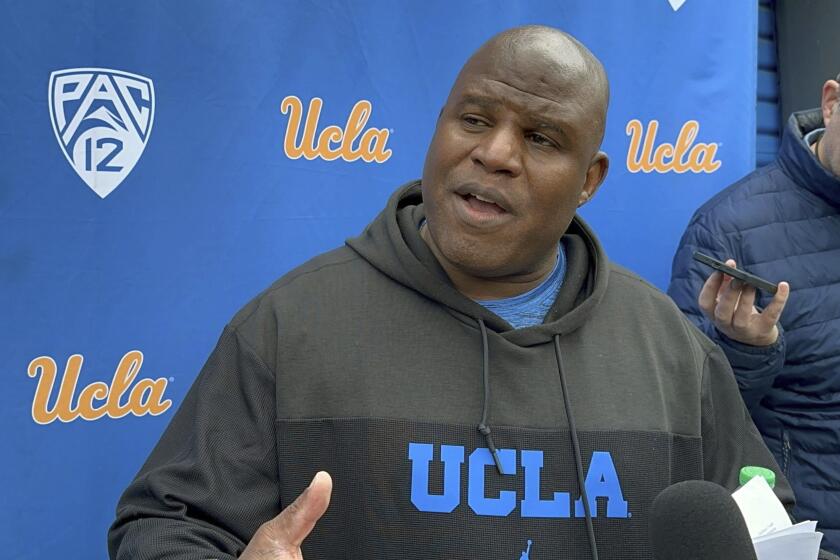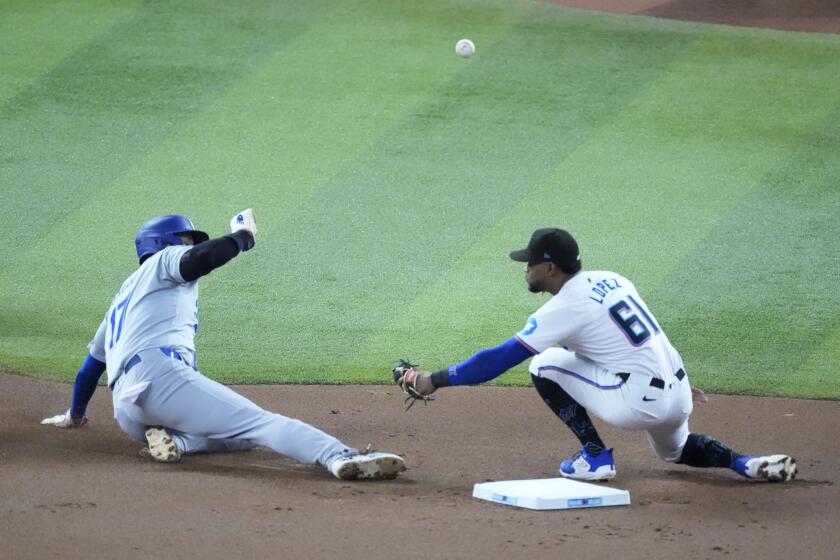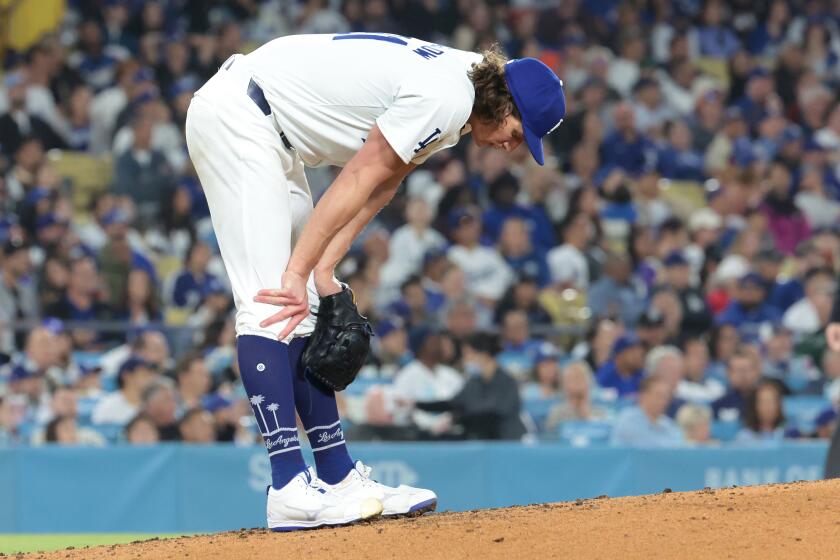Landis Declares He Is Innocent of Doping Allegation
Floyd Landis, champion of the 2006 Tour de France, declared Friday that he had raced clean and that he “deserved to win.”
Speaking Friday at a news conference in Madrid, Landis said he has naturally high “parameters” of the hormones testosterone and epitestosterone. Those levels, he said, explain why a doping test produced an irregular result after his breakaway Stage 17 win in the Alps on July 20 that sparked his historic victory at the 2006 Tour.
“We will explain to the world how this is not a doping case but a natural occurrence,” Landis said, adding that he intends to show “convincingly and categorically” that his winning ride was the product only of “many years of training” and “my complete devotion to cycling.”
But some anti-doping experts suggested that Landis’ assertions be viewed with caution, and a French newspaper account Friday cast doubt on his claims. “Things just don’t add up here,” said Gary Wadler, a Long Island physician, New York University Medical School professor and one of the nation’s leading anti-doping experts.
Later Friday, as part of an aggressive public-relations campaign, Landis appeared on National Public Radio’s “All Things Considered” and on ESPN’s “Outside The Lines.” He also spoke with reporters for the second day in a row via teleconference and broke away from that teleconference, with apologies, for an appearance on CNN’s “Larry King Live.”
On the NPR show, Landis was asked, “Were you doping in the Tour de France?”
He replied, “Absolutely not.”
Meanwhile, a French newspaper report, said lab results show the testosterone in Landis’ Stage 17 sample was synthetically produced, not natural.
“I haven’t heard anything about that,” Landis’ doctor, Brent Kay, said Friday.
Landis, 30, who was reared in Pennsylvania by Mennonite parents, now lives in Murrieta, Calif. He rode in the 2006 Tour with a degenerative hip condition and last Sunday became only the third American, after Lance Armstrong and Greg LeMond, to win the event.
Spain’s Oscar Pereiro finished second, Germany’s Andreas Kloden third. Landis made it atop the podium in Paris only after his remarkable race in Stage 17 through the Alps brought him back into contention, propelling him from 11th place to third. He won the stage by 5 minutes, 42 seconds.
The Stage 17 win came after a poor race by Landis the day before that had dropped him from the Tour lead. After the poor showing in Stage 16, Landis said he had a beer and some Jack Daniels whisky.
After his Stage 17 victory, Landis went to doping control -- a routine event for stage winners and for the overall leader of the race. On Wednesday, his Swiss-based team, Phonak, announced that his testosterone and epitestosterone readings had come back with what it called an “unusual level.”
That result is based on tests conducted at a French lab on the first of a two-part sample. The backup sample is scheduled to be tested in the coming days.
Landis said Friday he expects the backup sample to confirm the results of the first tests.
If the backup sample indeed shows irregular readings, Landis is likely to be charged with a doping offense. That will trigger a lengthy series of hearings that could lead to a finding of a violation. A violation could lead to the loss of his Tour title and a two-year suspension.
Landis was tested eight times during the Tour. It remains unclear why only the Stage 17 sample would yield an unusual reading.
The readings at issue match the amount of testosterone against a substance that also occurs naturally in the body, epitestosterone. Typically, the ratio is 1:1. Anything over 4:1 is suspect. The reading in Landis’ first sample has not been disclosed.
Landis said Friday, “There’s no evidence of any unnatural substance in my body.”
Although steroids traditionally are associated with strength-building, they can also be used to help the body recover from injury -- or exertion -- more quickly. Synthetic testosterone can, like other steroids, be delivered into the body in any number of ways: by spray, cream, injection, even a couple drops absorbed through the lining of the mouth. The French newspaper L’Equipe reported Friday that the lab that analyzed Landis’ sample also performed what’s called a “carbon isotope ratio analysis,” and that test showed the testosterone was synthetically produced.
Wadler, stressing that he was not commenting on the validity of the L’Equipe report, said, “If you can show that the testosterone is of [synthetic] origin ... then it’s a different question: how did that end up in your body?”
Kay told reporters, “The whole thing borders on hysteria. When the smoke clears, I think we’ll all look back and look at what we’ve done to Floyd. It’s almost like when we rounded up all the Japanese-Americans and put them in concentration camps in World War II. It’s almost this medieval witch hunt right now.”
The disclosure of Landis’ irregular test result has roiled cycling as well as sports worldwide.
The 2006 Tour, the first since 1999 without seven-time champion Armstrong, got underway only after the second-, third- and fourth-place finishers in the 2005 race, among others, were barred after being linked to a doping-related inquiry in Spain.
“Now people in and out of the sport were hoping that the exciting 2006 Tour... had confirmed that the anti-doping campaign was having an impact,” said Christopher Thompson, a Ball State professor and author of a book on the history of the Tour.
In a reference to Landis’ Stage 17 ride, Thompson added, “But if the author of the exploit that galvanized public attention turns out to have doped the day of that exploit -- it would not be a death knell by any means but it would be a very serious blow” to the sport.
Times staff writer Diane Pucin contributed to this report.
More to Read
Go beyond the scoreboard
Get the latest on L.A.'s teams in the daily Sports Report newsletter.
You may occasionally receive promotional content from the Los Angeles Times.










